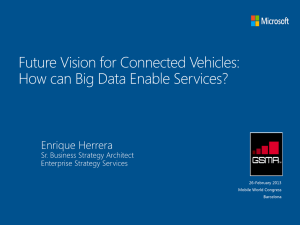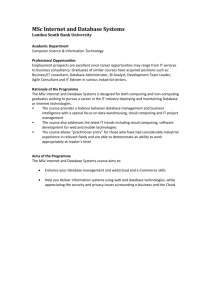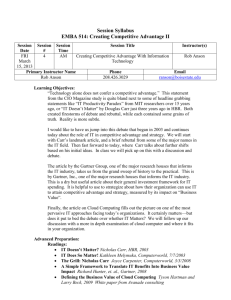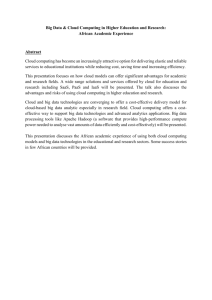Diamond: what is the big switch
advertisement
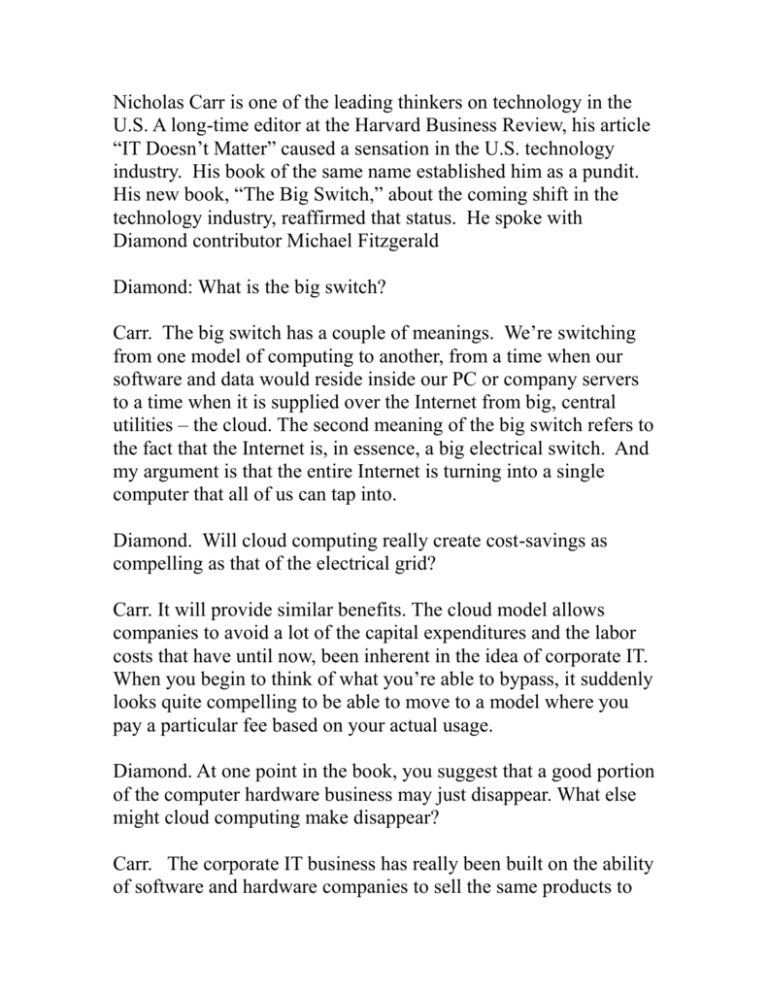
Nicholas Carr is one of the leading thinkers on technology in the U.S. A long-time editor at the Harvard Business Review, his article “IT Doesn’t Matter” caused a sensation in the U.S. technology industry. His book of the same name established him as a pundit. His new book, “The Big Switch,” about the coming shift in the technology industry, reaffirmed that status. He spoke with Diamond contributor Michael Fitzgerald Diamond: What is the big switch? Carr. The big switch has a couple of meanings. We’re switching from one model of computing to another, from a time when our software and data would reside inside our PC or company servers to a time when it is supplied over the Internet from big, central utilities – the cloud. The second meaning of the big switch refers to the fact that the Internet is, in essence, a big electrical switch. And my argument is that the entire Internet is turning into a single computer that all of us can tap into. Diamond. Will cloud computing really create cost-savings as compelling as that of the electrical grid? Carr. It will provide similar benefits. The cloud model allows companies to avoid a lot of the capital expenditures and the labor costs that have until now, been inherent in the idea of corporate IT. When you begin to think of what you’re able to bypass, it suddenly looks quite compelling to be able to move to a model where you pay a particular fee based on your actual usage. Diamond. At one point in the book, you suggest that a good portion of the computer hardware business may just disappear. What else might cloud computing make disappear? Carr. The corporate IT business has really been built on the ability of software and hardware companies to sell the same products to thousands, if not millions of customers, who all run it separately. What cloud computing implies is that when you centralize a lot of those things, you’ve fundamentally changed the IT business. Diamond. Will we still buy PCs? Carr. You’re going to still need devices to tap into this thing, and the PC has proven itself to be a very useful, very flexible device. So I don't think we’ll see them going away. On the other hand, you can foresee the shift of PCs to being much more like terminals, where everything they do is supplied from central data centers. Also, the PC will just be one device that we use. We’ll use our smart phone, and something in our dashboard of our car; we’ll have all sorts of ways to tap into the Internet. And that alone, I think, is going to propel the rise of cloud computing, because you’re going to want the same applications and the same data available to all those devices. Diamond. In the book, you raise the question of whether Microsoft can keep the profits from its old model alive and flowing long enough to shift into this new model. It’s been almost a year since you finished writing – is the answer clearer now? Carr. I don't think there’s anything that stops Microsoft from being able to go from selling what it used to sell as packaged software in more of a service model over the cloud. But these utility services aren’t going to operate at the same kind of profit margins as Microsoft has seen with Windows and Office. And it’s going to face companies like Amazon and like Salesforce.com and like Google that are actually content to operate at fairly small margins. It may do what General Electric did when the electric grid came along. GE used to make all its money by selling the components of individual generating stations for companies, and when the electric grid became ubiquitous, it moved into selling all sorts of appliances that you plug into that grid. Microsoft may be able to use Xbox and other things to do something similar. Diamond. Could you run on a cloud in Europe right now? Interviewee: This is where the cloud metaphor itself begins to break down. The cloud is actually made up of particular data centers that are in particular locations. In Europe and elsewhere, there are restrictions on where you can hold data. And so what it might mean is that as a supplier, you’ll have to be able to ensure that the data sits in the data center you operate in Dublin rather than the data center you operate in Washington State. Diamond. The idea of cloud computing is not new conceptually. It goes back to the beginnings of computing, to time sharing, or even the IBM and HP-driven utility or grid computing push of 2002? What do you say to skeptics? Carr. Companies are actually using them now. You look at what’s going on, and you see that a company like Salesforce.com is having a lot of success, you see Amazon Web Services getting huge clients. Diamond. You make a wonderful case in the book for why the development of the electrical grid, was so powerful for the economy of American and elsewhere. But that was atoms, the cloud is bits. So will it really be as rich a source of innovation, and as a force for societal change as electrification was? Carr. The electric grid changed the physical nature of society. The computing grid’s effects are going to be more on the intellectual sphere, how we interact with information and each other. Fifty years from now the world in its structures might not look massively different, but our culture and our intellectual lives will probably look quite different.





